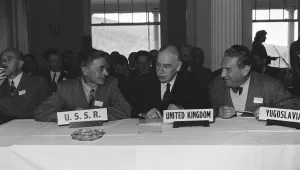International Security is America's leading peer-reviewed journal of security affairs.
Summary
The George W. Bush administration’s assessments of challenges that might come after the fall of Saddam Hussein’s regime in Iraq were wide of the mark, but it is unclear why this was the case. Along with the difficulty of anticipating the future, perhaps the opportunity costs of allocating resources to postconflict considerations were simply too high. Institutional biases and civil-military friction may have also led actors to privilege certain information and plans over others. Although plausible, these hypotheses do not sufficiently explain strategic assessment prior to the 2003 invasion. They cannot account for the substance of most senior policymakers’ assessments, especially those of President Bush and Defense Secretary Donald Rumsfeld, which was optimistic when late-stage operations were considered but not when combat plans were deliberated. An established psychological theory that describes how peoplementally represent distant future actions—as opposed to those that are seen as impending—explains the nature of strategic assessment in the Iraq case. As individuals think about actions at the end of a sequence of events, the desirability of their goals becomes increasingly salient relative to the feasibility of achieving them. This makes decisionmakers more prone to underestimate the costs and risks of future actions.
Rapport, Aaron. “The Long and Short of It: Cognitive Constraints on Leaders’ Assessments of 'Postwar' Iraq.” Winter 2012/13
The full text of this publication is available in the link below.





